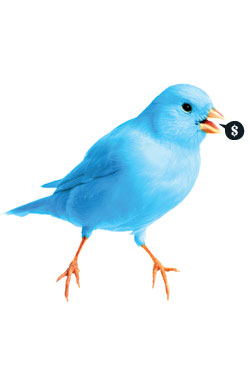
Back in 2007, journalist Dan Baum did not have his contract renewed by The New Yorker. This relatively old, not–particularly–pertinent–to–anyone–but–Dan Baum news became suddenly interesting recently, as Baum started writing online about his dismissal. Pardon me—not writing. Tweeting. Baum posted his story to his Twitter feed, 140 characters at a time. It was then picked up by blogs, to be read by all us recalcitrant non-Twitterers.
It’s likely you’d no sooner heard of Twitter than you learned that Ashton Kutcher was already using it. So was Anderson Cooper. Suddenly, every gnarled politician in D.C. was sending out “tweets” (instant group messages) to their “followers.” (I’m by no means an early adopter, but when John McCain beats me to a new gizmo, I worry.) Even Oprah is tweeting, prompting the Times to announce, “Twittermania has only begun.”
But one nagging question lingers: Just what is it good for? The implications of hive-mind citizen reporting are interesting, certainly. And it can work as a real-time search engine. But otherwise, being pestered by a constant stream of people’s thoughts sounds to me less like a communications breakthrough than a form of torture devised by Philip K. Dick.
Recently, Nielsen reported that 60 percent of people who use Twitter once fail to return the following month. (At a similar stage of its growth, Facebook only lost about 20 percent.) In response to this report, one online commenter argued that new users simply don’t get that Twitter is perfect for “involving your brand in relevant conversations.” Eureka! Maybe this explains why so many writers, pundits, politicians, and celebs tweet, even as the rest of America shrugs. After all, those are exactly the types to think that (a) their every stray thought is publishable poetry and (b) it’s crucial to constantly insert their name—their brand—into the conversation.
Which brings us back to Dan Baum. As it turned out, he had not only a story to tell but a product to sell: his book Nine Lives. A gossip site called Baum’s confessional “a watershed moment for Twitter, and storytelling in general,” and it’s true that a few of his updates achieved a koanlike beauty (e.g., David Remnick’s final dismissal: “ ‘That’s not possible,’ he said, and that was that”). But reading this entire tale on Twitter was like reading a novel, line by line, inside a thousand fortune cookies. Not ideal for storytelling, no, but man, what a fantastic gimmick.
That’s Twitter: A tool to mass-blast the public with whatever message you choose, whether you’re promoting your book or yourself. This practice used to have a different name: spam. But “tweeting” sounds much more cuddly than, say, “shilling,” and Twitter’s a much cuter name than Wiki-spam.
Have good intel? Send tips to [email protected].